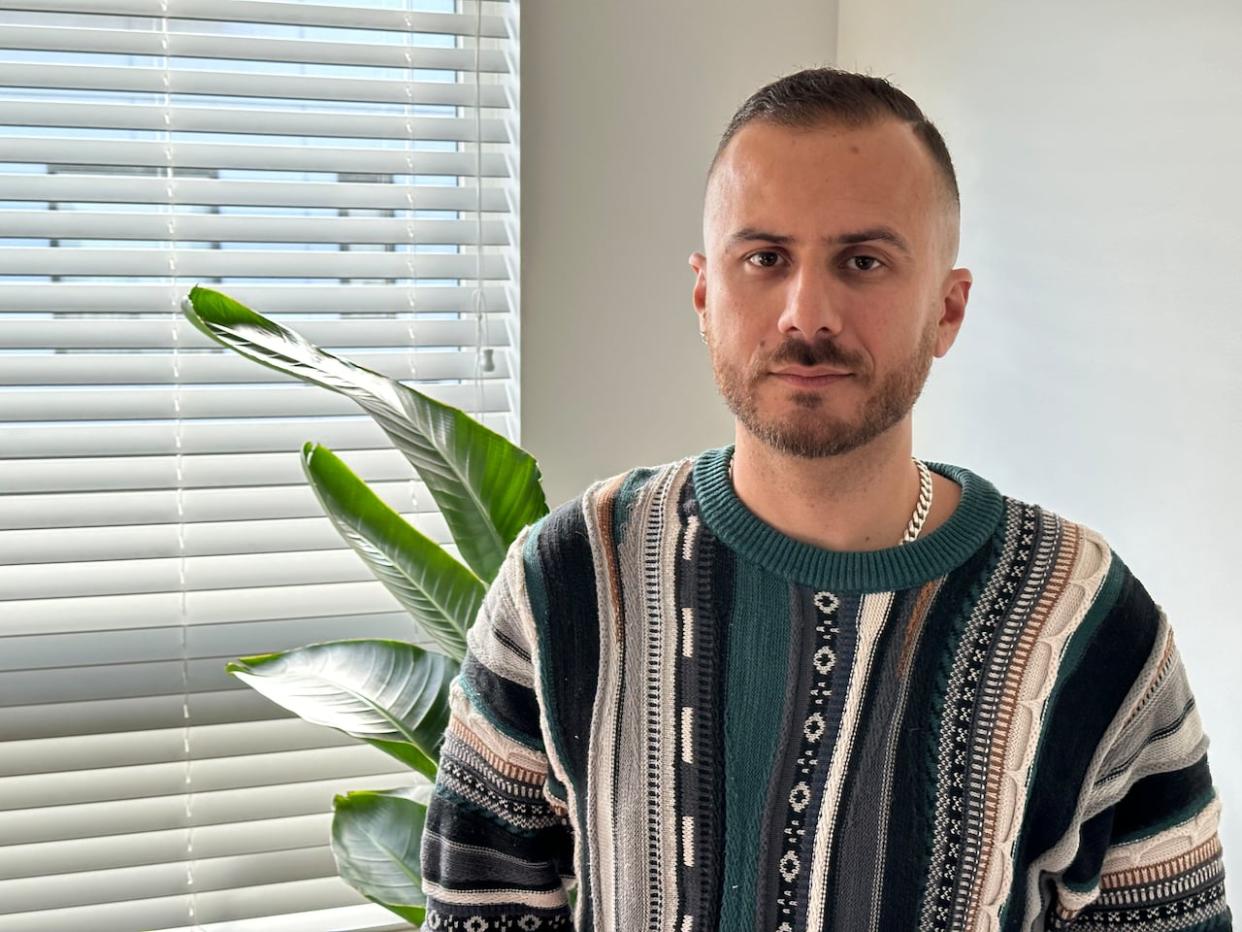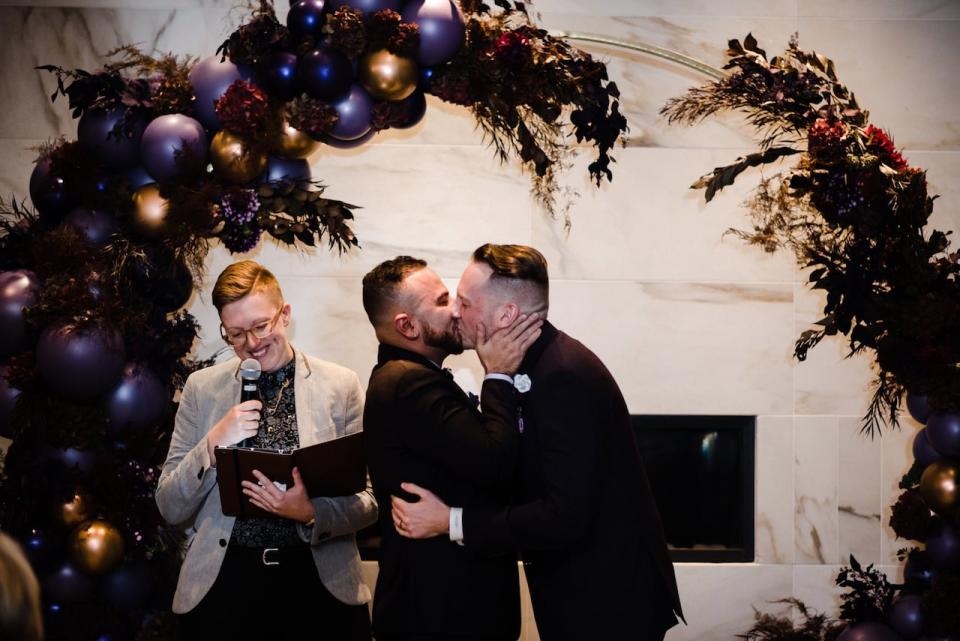Author, activist Danny Ramadan hopes his memoir will change you

- Oops!Something went wrong.Please try again later.
Danny Ramadan arrived in Vancouver in September 2014, having left his home in Damascus, Syria, as a 30-year-old man in search of safety amid an escalating war in his home country.
Since then, he's got married, voted as a Canadian and helped raise hundreds of thousands of dollars for 2SLGBTQ+ refugees.
He's also become a respected author: his novels The Clothesline Swing and Foghorn Echoes have received accolades from the Lambda Literary Awards, the B.C. Yukon Book Awards and the City of Vancouver, and his children's book Salma the Syrian Chef has won multiple awards and spawned several sequels.
But Ramadan's latest work is a little different. Crooked Teeth: A Queer Syrian Refugee Memoir delves into his own life before and after his arrival in Canada, taking readers from his home in Damascus to his home in Vancouver.
It asks questions of the reader and invites them to think more deeply and critically about the experiences he shares.
"I'm hoping to write a memoir that will be impactful for you, that will change you internally and externally — not just about your idea about me as a human being, but also about how you approach refugees and queer refugees in general," he said.
Ramadan spoke with CBC's North by Northwest host Margaret Gallagher about the book and the challenges he faced sharing such personal stories.
This interview has been edited for length and clarity.
Why did you want to write a memoir?
My fiction has helped me deal with the traumatic experience of being a refugee and coming here to Canada and finding home here. It felt like my shield. In a way, my fiction allowed me to tell you a lot about the truth without revealing a lot about what is real. Now I have a very successful career — I have two successful books, I have a supportive agent and publisher and editor. I have the power to write this book exactly how I wanted to write it.

Crooked Teeth is available now. (Penguin Canada)
What was it like to return to those early years in Damascus?
This is my treasure trove of all of the images from my childhood that I will never have access to ever again. My child at home doesn't exist anymore. Even if it did, I am not going to be able to visit it because I have spoken quite loudly about the Syrian regime, about the civil war in Syria. I don't think I'll ever be welcomed back to Damascus. So it feels like, in a way, those images are not just me trying to tell you about those places, but also me trying to protect them, to keep them for myself.
You were born Ahmad Ramadan. How did you come to the name Danny?
I have this relationship between Ahmad and Danny because I identified as both of them for the longest time. During my 20s, whenever I was hanging out in queer spaces, people knew me as Danny. And whenever I was hanging out in straight spaces, in mainstream society, to protect my myself from the homophobia in those societies, people knew me as Ahmad. So I have created those two identities.
When I was 17 or 18, I started dating — I mean, dating is a very generous word — I started seeing this much older gentleman in Damascus and we had a beautiful relationship. He was a mentor of sorts. And he's the one who picked the name Danny for me. This is me paying homage to that person who really introduced me to a lot of queerness, introduced me to a lot of what it means to be a queer person, a lot of queer media. He showed me my first episode of Queer as Folk. He was very important to me. And this is me appreciating that.
As part of your time in Syria you ran a safe house.
Syrian society is a segregated society. It's segregated based on gender, which means that boys hang out with boys and girls hang out with girls.
As a queer man, I was hanging out with a lot of gay men. I had a lot of gay friends in Syria in 2011 and I started inviting them over to my house because I also had the privilege of living on my own. Most men in Syria and women, of course, live in their family house until they're married and then they live in their marriage house. Nobody moves out.
But I had my own apartment and that made it a safe space for all of those gay people to come in and be themselves. And then I met a lesbian woman who started inviting her friends over to my house. Again, very organically, unintentionally, slowly but surely, this place became a hub for the queer, trans and lesbians to come in and hang out. We would watch queer movies together. We would play backgammon tournaments and throw parties together.

Vancouver author and activist Danny Ramadan (middle) marries his husband in 2019. (Danny Ramadan/Twitter)
It offered a societal feel to us that I'm very proud that it accomplished. It was a safe house at the end of the day, but it was not intentionally that way.
You write about your family of origin, but you also write about your chosen family.
I find it really important to name the people who have made the active decision to be my family. These folks who came into my life and took me in and cared for me. I feel privileged to be surrounded by so many people, past and present, who were my family.
You also write about how you are losing your memories of the streets of Damascus.
I haven't been in Damascus since 2012. I left Damascus under less than ideal circumstances. I was sitting down and writing this book, and at one point I was trying to describe a walk in the streets of Damascus. And I realized that no matter how hard I tried, I cannot remember what the street looks like.
I'm obsessed with Syria. I am obsessed with writing about it. I'm obsessed with writing about what it means to be from that part of the world. And slowly but surely, I'm losing that. I'm losing the essence of my obsession.
How did you decide when to end the book?
I had a plan for this memoir. I wanted to write it up until the moment that I found myself established here, up until a moment of joy. I read other Syrian refugee books and I read other refugee books and many of them. And the last chapter is that they arrive at the airport, which is wonderful.
But I don't think that's where the story ends. Arriving in Canada is a beautiful milestone. But it's the beginning of a new life. I think the balance between what your life was before arriving and what's life after arriving is what is important.

Danny Ramadan casts his first ballot as a Canadian in 2019. (Ben Nelms/CBC)

